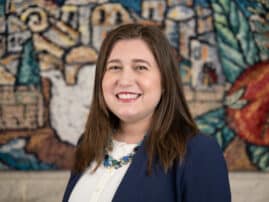Scroll Down
A World of Difference
By Rabbi Rachel Schmelkin on October 31, 2024

This post originally appeared in the “At the Table” newsletter from One America Movement, Oct. 30, 2024
My friend Tom is an evangelical pastor and one of my most cherished relationships. We met in the aftermath of the violent and deadly 2017 Unite the Right Rally in Charlottesville, Virginia where I served as a Rabbi at the time. The One America Movement brought us together as part of a small group of diverse faith leaders. I was eager to prove to myself that I could handle listening to an evangelical pastor’s ridiculous and misguided views. I knew others in our group were on “my side,” but Tom was different. Perhaps I could grow, I thought, by forcing myself to tolerate someone I disagree with. Maybe if I listened deeply enough, I could find holes in his arguments and help him realize he had it all wrong.
We met a few times but left politics out of the conversations. Weeks turned into months, and still, I didn’t know for sure where Tom stood on key issues like abortion, gun control, or immigration. Instead, I knew he shared my love of Thai food, and we both faced similar challenges that come with life on the pulpit. I began enjoying my time with him as if he was a new friend.
Tough Conversations Are Needed to Build Bridges
Eventually, we had to address the topics most likely to drive our group apart. The CEO of the One America Movement, Andrew Hanauer, taught us how to discuss contentious issues using a productive, healthy, story-centered approach. The conversations that ensued were as painful as they were enlightening. We didn’t change each other’s minds, but we saw one another’s humanity. As I listened to Tom, I understood where he came from even though I strongly disagreed. I felt the kind of care and compassion that I would for a dear friend, which he now was.
Tom and I still call each other often. He updates me on his 90-pound Lab, Grayson, and about his work at the One America Movement. I update him about my family and work at the Washington Hebrew Congregation. Usually, we discuss politics, challenging each other with humility and respect.
How did we come to have such a deep and sacred friendship? By moving slowly, by taking our time, and by tolerating the discomfort of not knowing exactly where the other person stood. Just as the Israelites wandered in the wilderness on a long, slow journey for 40 years — in the end, they reached the Promised Land.
As we approach a divisive election in a time of heightened polarization, we must reach across the aisle to build bridges and have the courage to get to know the people on the “other side.” As we do, we should not jump too quickly into hot topics and major debates. We should move slowly with intention, knowing that if we stay in the wilderness long enough, the person we plan to dislike and hope to prove wrong, could become a confidante and cherished friend by the time we reach our destination.
This article was written by Rabbi Rachel Schmelkin, Associate Rabbi of Washington Hebrew Congregation, and published in collaboration with Divided We Fall, with support from A More Perfect Union: The Jewish Partnership for Democracy.
 Previous Post
Previous Post